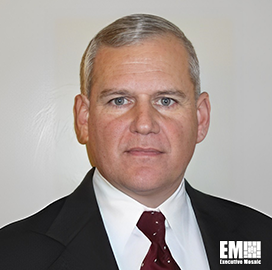
Jim Edwards
SVP
SOSi
Member Profile: Jim Edwards, SVP of Business Development at SOSi
As senior vice president of business development at SOSi, Jim Edwards works to drive company growth by securing new business and cultivating relationships with clients across the defense, intelligence and federal civilian sectors. Prior to his industry career, Edwards spent 25 years as an intelligence officer in the U.S. Army, and this experience has guided his efforts in the private sector.
Edwards recently participated in an interview with the Potomac Officers Club, during which he discussed his strategy for handling continuous change in the federal government, his core values and the challenges businesses face when innovating.
Read the full Executive Spotlight interview below:
What can you tell us about your background and how you’ve been able to adapt to the ever-changing challenges of the federal landscape over the course of your career?
I credit whatever success I’ve had in business development to my first career as an intelligence officer in the Army and federal civil service. Pursuing new business has many parallels with the skills I learned in service to our country. As an intelligence officer, you are often asked to collect information that enables you to identify threats and opportunities, assess situations – frequently with imperfect or incomplete information – and then predict what could happen in the future. As a business developer in the federal space, you must do a lot of the same things to help grow your company’s business. Almost daily, I am also reminded that there are parallels to what we’d describe in the government as operational security and counterintelligence, which is protecting information about our plans and neutralizing competitors’ abilities to collect that information about us. Advancements in technology and the information environment have dramatically changed how we do these things over the years, but the underlying reasons we do them are largely the same. I like to think I’ve been able to adapt to these changes in my career by remaining agile, open-minded and constantly seeking opportunities for self-improvement.
What are the core values that you believe are essential to building a great team and establishing a foundation to drive success in such a competitive industry?
I believe that integrity and mutual respect are the bedrocks upon which all successful teams and relationships are built. That is true within our companies and in our business-to-business and business-to-government interactions. Integrity and respect contribute to a shared commitment to achieving our goals.
I am a strong advocate for promoting diversity in our thoughts, backgrounds and approaches to problem solving. I strive to create an environment that encourages our team to explore new ideas, adopt new technologies, evaluate new business practices and collaborate broadly. Those who are afraid of change or alternative ideas are destined to become irrelevant as new ways of working upend our industry. Of course, these are not new ideas. When I was pursuing an MBA, we read noted leadership and management consultants like Steven Covey and Tom Peters, who were advocating similar thoughts more than 30 years ago.
With emerging technology influencing the federal government and industry more by the day, what are some of the challenges on the business side of innovation that aren’t always discussed as often as they should be?
I think use cases for artificial intelligence are getting a lot of well-deserved attention right now, but I don’t hear as much discussion about the impacts we are likely to see in how our industry pursues new business and delivers services on our contracts and how our customers will choose to buy these services in the future. For instance, what are the impacts on industry and the government’s acquisition teams when AI-assisted proposal development enables companies to submit many more credible bids without increasing their budgets? How will our opportunity evaluation, capture, bid and proposal processes have to change? And how will acquisition officials deal with the foreseeable increase in bid activity? Will we see shorter proposal requirements, more self-scoring matrices that place a premium on past performance, more limited bidders’ lists, shorter times to respond to RFPs or longer periods of source selection? As business leaders, we’re going to have to anticipate these impacts and position our organizations to succeed in whatever becomes the new normal.

Category: Executive Profiles




